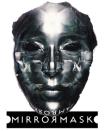

Mirrormask
For those seeking a genuinely magical (Gnostic) experience at the movies, I can’t recommend highly enough this recent film by Dave McKean and Neal Gaiman, easily the most inspired, creative, original, and visionary fantasy movie since The Matrix. According to Neal Gaiman (interviewed on the DVD), one Sony executive working on the film described it as “Like Cocteau’s Beauty and the Beast. On acid. For kids.” I think that’s a fair description, except for the fact that Mirrormask is definitely suitable for adults too.
The most richly conceived and imaginative use of CGI to date, Mirrormask takes place mostly in dreamtime, where McKean and Gaiman can flex their enormous creative muscles. That said, the prologue and epilogue, which occur in “real time,” are impressive too. McKean has a director’s eye and a flare for fantasy visuals to make the late, great Terry Gilliam green with envy. (Poor Terry, whose most recent film, The Brothers Grimm, saw him lost in Disney slums, must have suffered the torments of the deposed when he saw Mirrormask.)
McKean is a graphic artist, and he has no trouble translating his unique visuals to the cinematic medium. On the contrary, even while it is focused on the real world, the film is possessed of terrific vitality and has the visual confidence and flair of the best graphic novels. Once McKean and Gaiman take us into the dream world, however, all bets are off. When was the last time you saw a movie that kept you in a state of constant wonder and anticipation about what was going to happen next? In Mirrormask, every scene unfolds triumphantly to meet and surpass our hopes. The film overflows with visual delights, creativity, audacity, humor, and a suitably dark sense of the irrational. Any fantasy film worth its salt is going to aspire to the surreal, but it’s precious few that attain it. McKean and Gaiman join Méliès, Cocteau, the Quay brothers, and vintage Gilliam in achieving the ultimate goal of Surrealism, combining dream and reality to create a new interpretation of both.
Mirrormask is a very nearly blissful movie experience, an almost perfect blend of children’s’ fantasy (with the corresponding lightness and spontaneity) with the more disturbing subtexts of angst, despair, and schizophrenia that characterize the world of adults. For McKean and Gaiman, dream and nightmare aren’t at opposite poles. They meet comfortably in the middle, so you are never sure which way things are going to go. The same applies for “dream” and “reality”: there’s no easy way to say which is which in Mirrormask, because both partake of the same ingredients.
The common thread that runs through all the realms is sorcery. Mirrormask is everything that the Harry Potter films (even at their best) fail to be. It’s a movie that opens doors onto the hidden realms of the psyche, and invites us in to play. If you are going to make a movie about magic, you better know how to cast a spell. Harry Potter is passable stage magic. Gaiman and McKean are real magicians, and Mirrormask is their sorcery at work, and at play.





1 comment:
just saw this last week, i totally agree. a great film.
Post a Comment